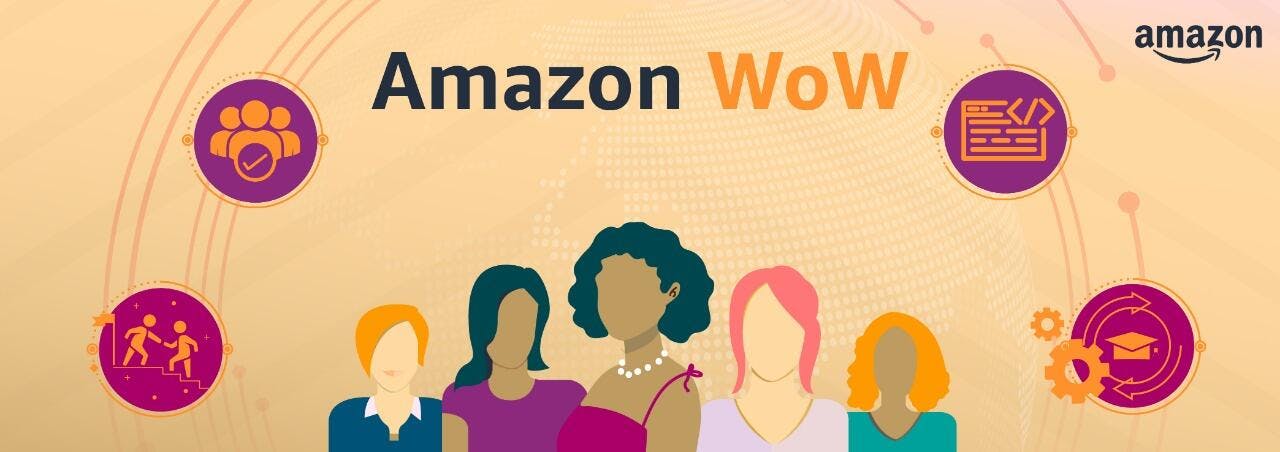In this post, I will draw a picture of my interview experience with Amazon for their SDE internship 😎 I was selected for this internship via the off-campus Amazon WoW program introduced by the company to promote women in their workforce.
Note: Even if you're not a female, I suggest you go through the rest of the article to get a general idea of how Amazon interviews look like.

Contents 📜
- Amazon WoW 💃🏻
- Round 1: Online Assessment
- Round 2: Online Assessment
- Round 3: Technical Interview 👩🏻💻
- Interview Tips 🥇
- Resources For You 🎁
Amazon WoW 💃🏻
Amazon WoW is a networking platform for girl students currently pursuing a four-year B.Tech/BE or two-year MCA, M.Tech/ME program, or five years Dual Degree. It is an excellent place for girls to connect with like-minded tech enthusiasts. Their website was launched in June '21. Soon after registering onto their platform, Amazon conducted several sessions on tech and leadership development.
Live sessions like "How to Build a Resume", "Tech Interviews Decoded", "Meet the Leaders Series" were really helpful and provided an insight into their working, principles, and values.

To register for Amazon WoW and know everything about it, visit this link. Past recordings are also provided on their website, do check them out.
Round 1: Online Assessment
Everyone who registered themselves onto the Amazon WoW portal and was eligible(2022 and 2023 pass-outs) received a link to this test. We were also asked to submit our Resume on their job portal. Check the last section of this post to find some resources on Resume making.
So, this online assessment was conducted on August 17th on Mettl. The duration of the test was around 1.5 hours. It consisted of problems and MCQs from several subjects. The 9 sections of this test were: Hands-on coding, Data Structures, Algorithms, Networking, Software Testing, Software Methodologies, Linux, OOPs, and Operating Systems.
The Hands-on coding question was on an easy-medium level. Each section had around 5 MCQs which were of medium-hard level difficulty. The questions were designed to test your understanding of the subject at a deeper level.
Round 2: Online Assessment
Shortly after the completion of Round 1, selected candidates were asked to give another assessment on August 25th on SHL. The duration of this test was 2 hours 35 minutes.
This test was comprised of 4 sections: Code Debugging, Coding Test, Workstyles Assessment, and Reasoning Ability. Questions from all the sections except the Reasoning Ability section could be revisited within the stipulated time.
In the Code Debugguing section, each question had a piece of code with errors or faulty logic. We would just have to correct the code or modify the logic in order to pass all the given test cases. I personally found the Code Debugging section easy.
The Coding Test again consisted of 2 coding questions. They were of medium-hard level. Anyone who has practiced medium-hard level questions on coding platforms can solve them.
Workstyles Assessment section evaluated a candidate's personality. The questions tested their ability to work with others, attitude, work ethic, and such. This section totally depends on the candidate. The questions were very straightforward.
Reasoning Ability Section had around 15 easy reasoning and logical questions. Basic common sense and 10th-grade math concepts were enough to solve them all.
Round 3: Technical Interview 👩🏻💻
Shortlisted candidates from Round 2 were asked to fill a survey providing dates for a face-to-face technical interview. My interview was scheduled for 3rd October and rescheduling of interviews was not entertained. It was a 1-hour long technical interview conducted on Amazon Chime.
The interview began with us introducing each other. I mentioned my hobbies and went on to talk about the technologies that I was passionate about. Since I mentioned that I was learning Node.js, the interviewer asked me questions about it.
Next, I was asked to solve an easy-level question on Strings. This was an easy question for me since I had an ample amount of practice at DSA. I wrote down the algorithm in the shared doc to make sure the interviewer remembers my approach even after the interview has ended. Once the approach was clear, I was asked to figure out some test cases and corner cases and then test my algorithm with them. Once that was done, I coded my approach in C++ and cleared it of all bugs. Time and Space complexity analysis was also discussed.
After the first question was over, we went ahead with another question. This was a medium-hard level question on Graphs data structure. I gave both brute force and efficient algorithms for this question. We also discussed another solution using Hash Sets. Once the time and space complexity analysis was done, I coded a production-level ready program for it using Graphs.
We also gave a dry run on multiple test cases for all my solutions.
The interview went a bit over time. In the end, I asked the interviewer about his work at Amazon and to give me a laymen's understanding of the operations his team carried out. The conversation was super interesting and fun.
Interview Tips 🥇
Here are a few tips that were given by my mentors that helped me during my interviews so far:
Mention only those things that you are sure you have complete knowledge of. Do not mention a tech stack or any other experience that you are unsure of.
Answer behavioral questions using the STAR method.
Never get intimidated by the interviewer. They are here to help you out. Don't understand the question? Ask them! Many-a-times interviewers ask incomplete questions to see the way you analyze the question and notice the missing details.
Use clean code practices: Function decomposition, meaningful variable and function names, space before and after operators, code indentation, consistent variable naming case (snake case, camel case, pascal case), etc.
Never jump to coding your solution. Provide your algorithm first. Write it in the shared document in bullet points. This ensures that the interviewer remembers the way you came up with your logic when he/she evaluates you after the interview.
Think out loud. Maintain an active conversation between you and the interviewer. Let the interviewer know about the logic you're thinking of. This way they can correct you if you're wrong or encourage you to go ahead. Never remain silent in a face-to-face interview.
Make yourself well acquainted with time and space complexity analysis. Many questions and discussions can be expected on this.
Never give the efficient approach on the first go. Go with the brute force solution first and then optimize your existing approach.
Try to come up with as many test cases (including corner and boundary cases) as possible for your solution. This will lead to a fool-proof production-level ready code.
Keep practicing problems on various coding platforms like LeetCode, Hackerrank, Codeforces, etc. You can also try to time yourself while practicing or attempt contests.
Before giving your actual interview, ask your friend to take a few mock interviews for you. I used Pramp for this. Check the below section for the link
Though it is optional, come ready with smart questions to ask the interviewer at the end of your interview.
Resources For You 🎁
Algorithms Playlist by Abdul Bari sir. Recommend watching at 1.25x or 1.5x speed.
Practice problems on Hackerrank, Leetcode, Codechef, Interviewbit, Codeforces, etc. Pick any one of these platforms and start coding!
Coding platform for group study: binarysearch.com
Give mock interviews at pramp.com
Thanks for reading my interview experience. I have listed every single thing about it and all the resources that I have used during my preparation. Interviews can be intimidating, but I hope this post helped you figure out stuff. If you find any corrections in my post, feel free to comment it down below, I'm a novice myself. Do like and share this post with your friends, cheers! ✨
